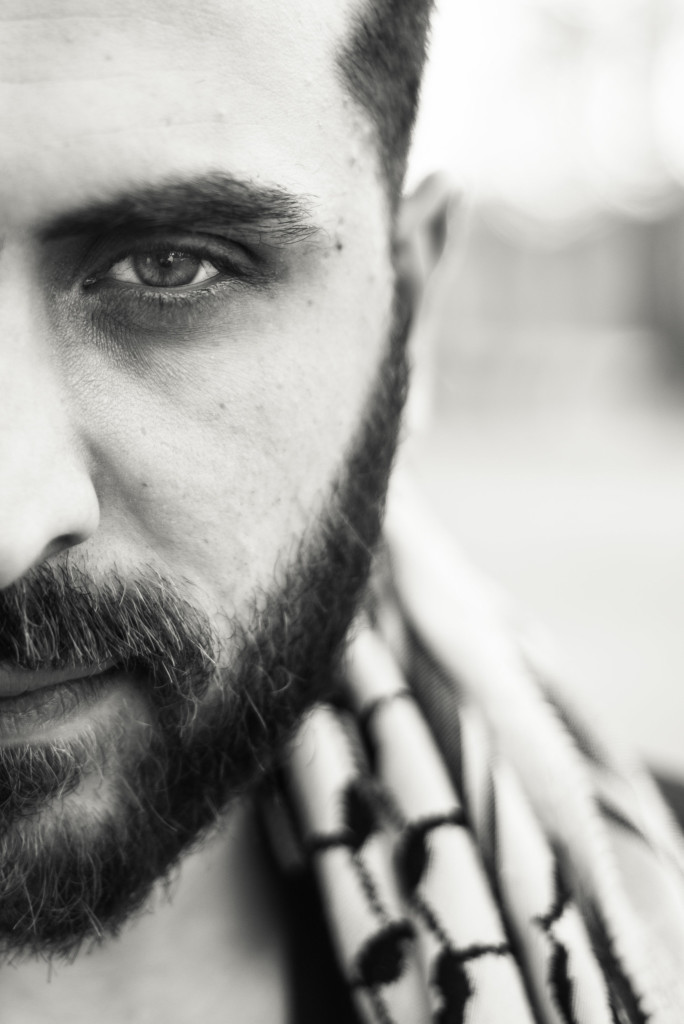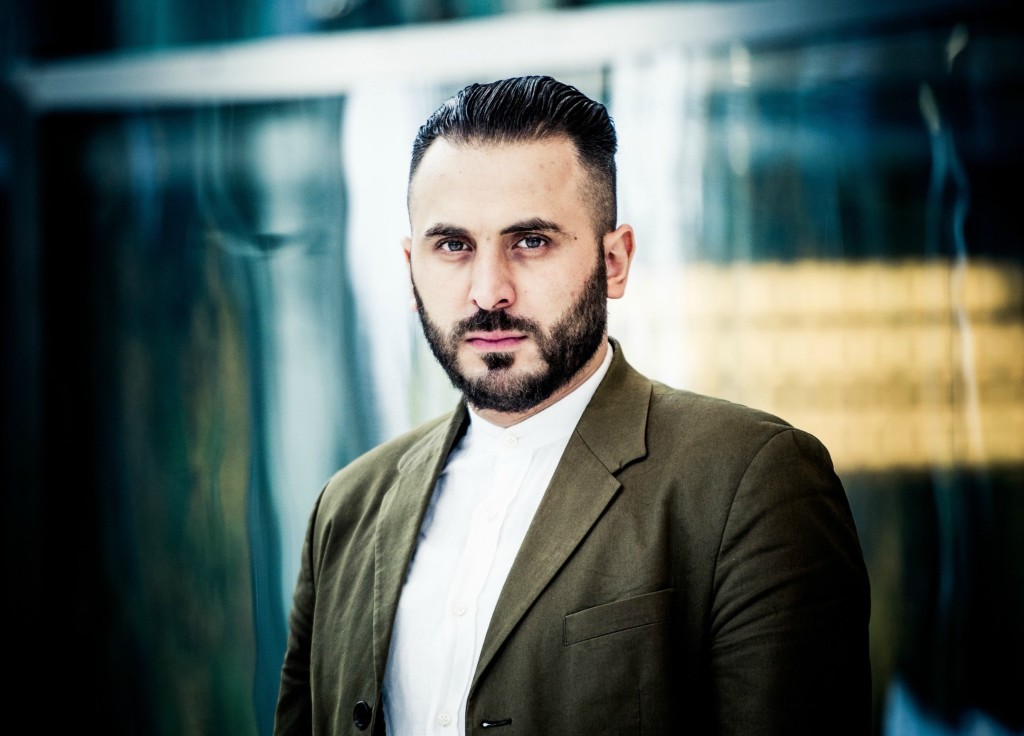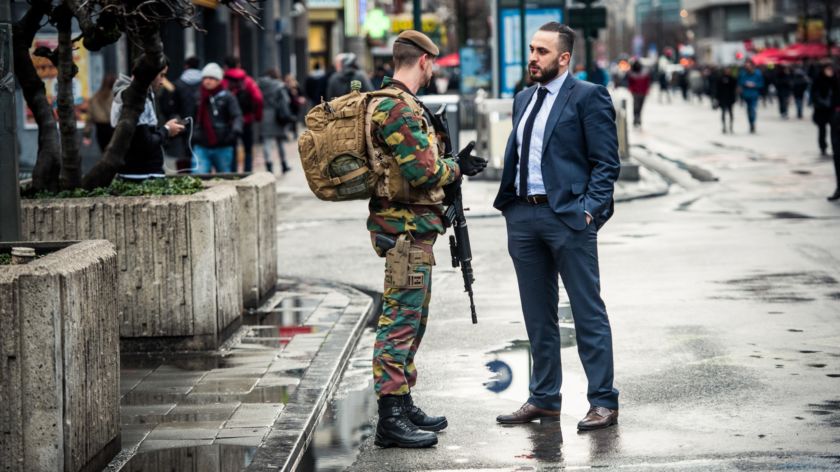Summer interview (1): Montasser AlDe’emeh
He gets WhatsApp messages from Raqqa: “We’re coming to get you!” External PhD candidate Montasser AlDe’emeh went to Aleppo to visit Dutch and Flemish Jihadists. To the rage of the IS he then proceeded to stop dozens of radicalized young people from fighting in Syria.
Montasser AlDe’emeh (1988) sits in a Brussels café, casually scrolling through his WhatsApp list. ‘Look,’ he says. ‘These people are all in Syria, joining the IS.’ He opens an old conversation about a Syria fighter from Kortrijk who blew himself up last year in Iraq. His mother was worried and informed AlDe’emeh, who tried without success to get the nineteen-year old to change his mind. To the rage of the IS, as is apparent from the messages he received at the time: ‘How dare you talk to him about his suicide attack? Are you trying to brainwash him? You dirty kuffar dog (infidel, eds.)!’
‘I was not allowed to have a girlfriend, and I wore a huge Jihadist beard’
Another WhatsApp message from Raqqa: ‘We’re coming to get you!’ AlDe’emeh’s responded with ‘Well, come on then! Do you think I’m scared?’ And ‘Real men don’t send insults from behind a screen.’ Chatting with suicide terrorists and countering death threats is not part of the standard job description of Radboud University researchers. Who is this external PhD candidate? And how did he end up at the Syrian front?
Vox looked him up in the Brussels Sint-Jans-Molenbeek neighbourhood where he lives. On this sunny afternoon there is nothing to indicate to the outsider that this is the district described by The New York Times as the ‘Jihad centre of Europe’. Children are playing, people greet each other, and the only police officers on the streets are there to ensure that an ongoing demonstration proceeds peacefully. And yet, at least three of the eight terrorists in the Paris attacks came from this neighbourhood.
Jihadist beard
It’s the perfect spot for Montasser AlDe’emeh. As an external PhD candidate at the Faculty of Philosophy, Theology and Religious Studies, he studies radicalizing young Muslims. ‘I investigate how these young people interpret certain concepts within Islam,’ he says. ‘Terms such as ‘Jihad’ and ‘Caliphate’ are often given an ultra-radical interpretation. I compare various interpretations. It’s too soon to draw conclusions, but it seems that the radicalized youth are following Jihad ideologists who were already popular when Jihadists were fighting against the Soviet Union in Afghanistan in the 1980s.’

The way in which AlDe’emeh conducts his research is unique. Rather than looking to ancient writings and learned men, he examines how today’s radical youth views Islam. AlDe’emeh has spent a lot of time with young extremists. The closed radical Muslim community accepted him as a fly on the wall.
‘I am a Palestinian, I come from a prominent tribe, and I know the Quran like the back of my hand,’ he says. ‘That’s why I was more easily accepted than other researchers. But I still had to pretend to be someone else. For two years, I was fully integrated in those circles. I was not allowed to have a girlfriend, and I wore a huge Jihadist beard. I said things to the media that I didn’t mean, and I had to pretend to be much more radical than I was.’ It was probably around this time that his name first appeared on the radar of the intelligence services.
Al-Qaida
AlDe’emeh does not think of it as putting on a show, but rather as a research method that increased his survival chances. And it worked. Via ex-members of the now illegal Salafist and Jihadist organisation Sharia4Belgium, he managed in the summer of 2014 to get invited to a house in the Aleppo countryside where Flemish and Dutch Jihadists were residing. The group was fighting for the Al-Qaida-related Al-Nusra Front, primarily against Assad. ‘I simply had to go. I thought: ‘If I don’t do this now, I never will. If I go, I will either die, or become the only researcher in the world to have been right at the heart of this. I don’t want to spend my life writing research papers. I have greater ambitions.’
He left without telling his family. It turned out to be a surrealistic trip. ‘Already on the plane from Istanbul to Hatay I saw people thinking: ‘That guy with the beard is going to Syria.’ In Hatay I took a taxi to the border. There were Jihadists everywhere. Ten metres from the border someone was distributing ID cards to fighters who wanted to enter Syria – right under the nose of the Turkish police. This guy looked at me and searched through his stack for a photograph that looked like me. Suddenly the gate opened and I could walk through – without a fake ID. I only had to bribe a Turkish policeman with a few dozen dollars.’
When his blindfold was removed, he found himself facing two masked men with Kalashnikovs
Once ‘inside’ he travelled to a villa with a swimming pool where Flemish and Dutch Syria fighters were residing. He saw things he will never forget. Hospitals with children covered in flies. Bombs exploding a few hundred metres away. Entire neighbourhoods nearly erased from the surface of the Earth.
Things became really scary when AlDe’emeh ended up in the rebel prison. He had asked everywhere whether he could speak to Abu Mohammad al-Julani, the highest Al-Nusra chief in Syria. This caused some suspicion. He was arrested, blindfolded and put into a car. When his blindfold was removed, he found himself facing two masked men with Kalashnikovs, in a sweltering room somewhere in the desert.
‘It was such a bizarre situation – only the day before I had been sitting in a Brussels café – that I fell asleep waiting. In the end I was interrogated by the highest chief of the Al-Nusra intelligence services. After a very long day, I was allowed to leave. The boys at the villa were happy to see me; they didn’t know whether they would ever see me again.’
Once back in Belgium, AlDe’emeh tried to return to his old life. He helped young delinquents and gave lectures. This has led to him having quite a reputation in Brussels. On our walk to and from the café, he is accosted four times by people wanting to shake his hand. These meetings all have the same form: ‘How are you? When will you drop by again?’ The people asking turn out to be staff members from schools where AlDe’emeh speaks on a regular basis.
After his return from Syria, the traumatic images kept haunting him. He had lost his faith in mankind. AlDe’emeh became suicidal. His plan was to walk into a forest in Norway and freeze to death.
In the end, he managed to conquer his depression without help from a psychologist or drugs. The smiling children’s faces at the schools where he lectures really helped him. Bit by bit he picked himself up again. In between nightmares and bouts of depression, the sun would shine from time to time. Strangely enough his recovery was boosted by last year’s Paris attacks. ‘This kind of attack is just too crazy for words. That was the moment for me to really stand up for what I believe. I knew then that it had to stop. Before my trip to Syria, I had remained vague about Muslim extremism, but since the attacks, I no longer mince my words. I openly say what I believe, think and feel. This has freed me. I am slowly turning into the Montasser I was meant to be.’ Since then, AlDe’emeh has become the greatest IS critic in the Flemish media. Newspapers, magazines and television crews know where to find him. For a long time, he ran a deradicalisation centre in Mechelen, and later also one in Molenbeek. This did not go unnoticed by the IS. Via Flemish Jihadists in Raqqa he found out that his name appears on a ‘list’ of targets. ‘Some of these guys probably know where I live.’

But AlDe’emeh is not afraid. ‘I’ve decided to ignore threats. I don’t want police protection, and I don’t spend my time looking over my shoulder. I just say what I want to say, and that’s it.’ He falls silent for a moment and clears his throat. ‘Is your recorder still on? Good, because I have a message for the IS: I won’t stop. I have singlehandedly prevented dozens of young people from going to Syria. You may be able to kill my body, but not my ideas. I will go on.’
He smiles as he says it, but he is also deadly serious. He swears that this is no empty promise. ‘These guys are radical, which means we have to be radical too. I don’t believe that love conquers everything. But courage does, and power. And a clear vision. How can you feel love for someone who wants to blow himself up in a theatre full of people? These people have to stop making death threats. If they come after me, I will have the Belgian flag fly over Raqqa in memory of the victims of the Brussels attacks. I mean it. How? They will find out soon enough.’
The walls of his room were covered in posters of Che Guevara, Fidel Castro and Osama bin Laden
9/11
Montasser AlDe’emeh was born in a refugee camp in Jordan in 1988, after his Palestinian parents had fled Israel. The AlDe’emeh family ended up living on a farm in a village near Dendermonde. The young Montasser never felt at home there. He was the only immigrant of his age in the small Flemish village. And the only Muslim. AlDe’emeh knows from experience about the rift that radicalising young Belgians can fall into.
He became really conscious of it on 12 September 2001, one day after the 9/11 attacks. He refers to this as the first day of the rest of his life. Belgium was polarised, and the thirteen-year old Montasser was called names because he was a Muslim. He felt misunderstood, and began to radicalise. As a teenager he made plans to go and fight for the cause in Palestine. The walls of his room were covered in posters of Che Guevara, Fidel Castro and Osama bin Laden. He devoured radical Islamic texts.
In the end AlDe’emeh saw the light in a lecture on the History of Judaism at the university in Leuven. ‘When the professor began his lecture, my mind quite literally opened. I have never since come closer to the experience of ‘enlightenment’. All the soap bubbles I had believed in burst.’ AlDe’emeh went on a study trip to Auschwitz, where he found out about the Holocaust, which his father had always told him was ‘not such a big deal’.
Secret service
Based on these experiences, AlDe’emeh went on to work hard in his own deradicalisation centre to help young people who felt lost in radical Islam. He told them a different, more nuanced story, and tried to put them back on the right track. He was recently forced to stop. ‘It’s over. I am not allowed to do it anymore.
For a long time I have worked to create a better world, but the authorities are clearly not interested in cooperation. I now plan to focus on my PhD research at Radboud University, so that I can come back stronger.’
‘There I am, on a terrace in Paris, and I get a phone call from the French secret services. Asking me whether I want to drop by for a chat.’
But letting go is not easy. On his phone screen, he shows me a message from Syria: ‘My son is dying. Please help him come back to Belgium.’ From a mother stuck in Syria with her young son. There is a photograph too, sent from the hospital. ‘There is nothing I can do,’ answers AlDe’emeh. ‘You have to get in touch with the Federal Public Prosecutor’s Office.’
He explains: ‘What if I help someone come back and then they commit an attack here? I cannot risk endangering an entire country out of a feeling of empathy for a single individual. I have had to harden my heart, and I no longer help these people. Besides, if after seeing images of the horrors perpetrated there, a person is still stupid enough to want go to Syria, they have to bear the consequences.’
AlDe’emeh doesn’t know what he wants to do after his PhD. He is being head-hunted by a number of American institutions. Various intelligence services have already paid him a visit. ‘There I am, on a terrace in Paris, and I get a phone call from the French secret services. Asking me whether I want to drop by for a chat. How did they know I was in France? My phone is probably tapped. Don’t get me wrong: I think I have more contacts in radical circles than any other person in the Netherlands or in Belgium.’
He is not interested in a career as a spy. ‘I like to help. I am often approached on Facebook by people who want to talk. The deradicalisation centre had to be dismantled, but I don’t send people in Belgium away. I am always open to dialogue. If someone is stuck and I can help, why shouldn’t I?’




